Ljubljana related
STA, 14 August 2019 - Foreign Minister Miro Cerar and his visiting Japanese counterpart Taro Kono called for a further deepening of economic cooperation between the two countries in Ljubljana on Wednesday. They also urged respect for the rule of law and for arbitration decisions, including with regard to the Adriatic and the South China Sea.
During what is the first visit by a Japanese foreign minister to Ljubljana, the pair also exchanged views on developments in Asia, in particular the tensions on the Korean Peninsula, the trade dispute between the US and China, while they also discussed the situation in the Western Balkans.
Cerar and Kono, who first met on the sidelines of this year's Munich Security Conference, agreed to strengthen bilateral relations and economic ties.
"Minister Kono and I agreed that possibilities to increase trade in goods expanded vastly with the entry into force of the economic partnership agreement between the EU and Japan, but also that all the opportunities for cooperation have not been used sufficiently yet," Cerar said today.
The ministers identified the Koper port as one of the opportunities for closer cooperation with Kono telling reporters that the Slovenian port was among the first after the Suez Canal with good access to Central Europe, which made it interesting for Japanese companies.
Zunanja ministra ??Japonske in ??Slovenije o gospodarskem partnerstvu in skupnih pobudah na Zahodnem Balkanu ?https://t.co/eVw2c2jnWg pic.twitter.com/hpbIRRPzFt
— SLOVENIAN MFA (@MZZRS) August 14, 2019
While no concrete projects were discussed, Kono suggested Slovenia enhanced promotion of its business environment in Japan. His press officer Jun Saito said they welcomed seminars planned for September to inform Japanese businesses about Slovenia.
He said that it took time for Japanese companies to take a decision on cooperation, but once they did they were very loyal and were looking for long-term cooperation.
Trade between the two countries has been fairly modest, with Slovenian exports amounting to EUR 119 million in 2018 and imports to EUR 86 million, which made Japan Slovenia's 32nd largest trade partner. Still, cooperation has intensified in recent years, which is also reflected in increasing Japanese investment in Slovenia.
Economic cooperation was also in focus of a working lunch at which the two foreign ministers were joined by Economy Ministry State Secretary Aleš Cantarutti.
New opportunities for cooperation are emerging in the field of smart networks, proton cancer therapy and electro mobility. Successful cooperation has moreover been established in the field of new physics between Slovenia's Jožef Stefan Institute and Japan's KEK.
On Tuesday, representatives of the Slovenian rehabilitation hospital URI - Soča and of Japan's Toyota Motor Corporation and Fujita Health University signed an agreement on cooperation in the development of medical therapy robots.
Vesel sem, da smo v letih, ko sem vodil @vladaRS, našli pot za investicijo #Yaskawa?? v ??. Danes sva si z @konotaromp skupaj ogledala njihovo tovarno v #Kočevje. Gre za napredno tehnologijo 21. stoletja, do leta 2023 bo zaposlenih 200 ljudi, investicija je znašala 25mio €. pic.twitter.com/c24dSCWakM
— dr. Miro Cerar (@MiroCerar) August 14, 2019
Cerar noted that Japan, with its economic and technological development, can serve as model to many countries. He is happy that the Japanese Yaskawa robotics company and Japanese multinational Sumitomo Rubber Industries launched investments in Slovenia when he served as prime minister between 2014 and 2018.
According to Kono, the Japanese companies doing business in Slovenia valued in particular its highly skilled workforce. "Many Japanese companies notice Slovenia because of its qualified labour force in information technology and high technologies."
Yaskawa opened its first European robot factory in the south-eastern town of Kočevje in April, and Cerar and Kono are scheduled to visit it today. Kono has also been received by President Pahor.
Meanwhile, the pair also discussed initiatives for deeper cooperation in the Western Balkans and Cerar thanked his counterpart for Japan's long-standing support for the Slovenian-run ITF demining fund.
Also discussed were the 2020 Tokyo Olympics, where the ambassador of the House of Slovenia will be Miro Cerar senior, the winner of a golden medal in gymnastics at the 1964 Olympics in Tokyo, the Foreign Ministry announced.
The athlete's son, Foreign Minister Cerar, also highlighted today the alley of 300 cherry trees outside the Ljubljana Biology Centre that were given to Slovenia as a present in 1999, which he said was a special symbol of friendship between the two countries.
Pahor's office reported that the Japanese foreign minister thanked the Slovenian president for his decision to attend the enthronement ceremony for Japanese Emperor Naruhito in the autumn.
The office also noted Pahor's working visit to Tokyo in 2013 in what was the first visit by a Slovenian head of state in Japan. On the occasion, he was received by the then Emperor Akihito.
According to the president's office, Pahor and Kono hailed the friendship between the two countries and good political, cultural, economic and scientific links between them. Pahor also welcomed Japanese investment in Slovenia, a country that he said made a suitable gateway to Europe for Japanese businesses.
The Japanese foreign minister is due in Croatia later today for talks on Croatia's stint at the presidency of the EU, and bilateral relations, including economic cooperation, the Japanese Foreign Ministry said, but could not say whether opportunities afforded by Croatian ports would be discussed as well.
STA, 13 August 2019 - Japanese and Slovenian partners signed two agreements in Ljubljana on Tuesday that pave the way for cooperation in development and research of robotised rehabilitation devices.
Fujita Health University signed one of the accords with the University of Ljubljana and the other with the Ljubljana-based URI Soča Rehabilitation Institute, and Toyota Motor Corporation.
The signing was attended by Economy Ministry State Secretary Aleš Cantarutti, who praised it as a major paving stone for further cooperation between Slovenia and Japan in the field.
"Cooperation between Slovenia and Japan has seen tremendous progress in recent years," said Cantarutti, praising the agreements as an "excellent example of cooperation between science and research and business", and a new opportunity to upgrade medical rehabilitation robotics.
Bilateral cooperation was also praised by Japanese Ambassador to Slovenia Masaharu Yoshida, who noted that Fujita Health University was a leading institution in the field in Japan. The university operates Japan's largest university hospital, treating 1.83 million patients a year.
"The agreement signed today will allow us to find a common path in development of rehabilitation robots and, above all, to put them on the market," said Robert Cugelj, director general of URI Soča.
The institute's main goal is to get its expertise and technology into the real world, and sell it. "In this way we generate value added mainly for patients, both those from Slovenia and elsewhere," said Cugelj.
The head of the institute's research and development department, Zlatko Matjačić, presented two projects that formed the basis for cooperation.
One is a rehab robot to train patients how to maintain balance and movement coordination during walking, which is being developed by the Slovenian institute, and the other is a robot developed by Fujita Health University and Toyota.
These are two exoskeletal devices focusing on two different areas. "The Japanese have focused on the leg's function and support during walk, while we're focusing on the integrated function of balance and coordination," Matjačić said.
They would now like to combine their expertise, technology and experience into a now concept to help in the rehabilitation of patients after stroke.
Fujita Health University professor and president Eiichi Saitoh was happy that the university was linking with the world's leading rehabilitation institutions, expressing belief that expertise is expanded and enriched through such cooperation.
Keisuke Suga of Toyota's BR-Medicare hailed the new partnership, which said would help implement Toyota's vision of mobility for all. The department headed by Suga specializes in development and production of devices used in patient rehabilitation.
The Japanese delegation already met Health Ministry State Secretary Simona Repar Bornšek on Monday and will be received along with URI Soča officials by President Borut Pahor on Wednesday.
All our stories on Japan are here, while those on robotics are here
The best website for regional aviation news, Ex-Yu Aviation, reports that All Nippon Airways (ANA), Japan’s largest carrier, will be returning to Ljubljana later this month, with two direct flights being operated for Japan’s largest tour operator.
Flight NH1951 will fly from Osaka Kansai International to Ljubljana on August 31, departing at 13:05 and landing in Slovenia at 18:5 the same day. The second flight, NH1955, will go from Tokyo to Ljubljana and leave Narita Airport at 09:00 on September 14, arriving at Ljubljana Airport at 14:00. The service will be operated using a wide-body Boeing 787-9 aircraft.
In June of this year the Slovenian State Secretary at the Ministry for Economy and Technological Development, Aleš Cantarutti, received a visit from Yoshihiro Seki, Japan's Minister for Economy, Commerce and Industry, in which they discussed the plans for more regular nonstop flights between the two countries. More on this story, including ANA’s new flights to Croatia, can be found at Ex-Yu Aviation.
STA, 2 August 2019 - The operator of Slovenia's sole maritime port of Koper is hosting on Friday a delegation from Nagoya, the largest Japanese port in terms of transshipment, for talks on how to expand cooperation. Koper has no direct commercial maritime link with Japan, while it does cooperate with the Japanese Ocean Network Express (ONE).
The delegation featuring more than 30 representatives of the public and private sectors, the port of Nagoya and the chamber of commerce and industry from the city is in Slovenia before making stops in Italy and Croatia.
Representatives of Luka Koper presented the Japanese with the advantages of the port of Koper and the Adriatic Sea in general.
Japan is a major trade partner to Luka Koper, with last year's transshipment reaching almost half a million tonnes. The bulk of the transshipment are containers and cars, with Japan being one of the largest car producers in the world.
The port of Nagoya is the largest and busiest trading port in Japan, with an annual transshipment of 197 million tonnes, including 2.7 million container units and 1.4 million cars.
Luka Koper chairman Dimitrij Zadel told the press on the sidelines of the visit that efforts were being made to establish a direct link with Japan, noting that the port had been cooperating with ONE as of last year.
Today's presentation was also attended by representatives of Japanese companies which are already present in the region.
Tamas Tanarki of the Hungarian subsidiary of Yusen Logistics said that in the last decade, Japanese investors had started taking the Adriatic route into account and perceiving it as a good solution for their cargo transport.
He sees no much room for the Adriatic ports to compete with the North Sea ports in the near future, but he said it was realistic to expect that trade with these ports could increase by between 10% and 15%.
Tanarki thinks that what is important for the ports in north Adriatic is to agree on cooperation, as Trieste, Koper and Rijeka are only 70 kilometres apart, which is considered as one sole port on the global scale.
This Saturday, 22 June (2019) is the 8th annual Day of Japan (Japonske Dan) in Ljubljana, organized by Genki Center and the Embassy of Japan in Slovenia. We got in touch with Maja Rome, of the Genki Center, and learned more about her work, the Center, and the day itself.
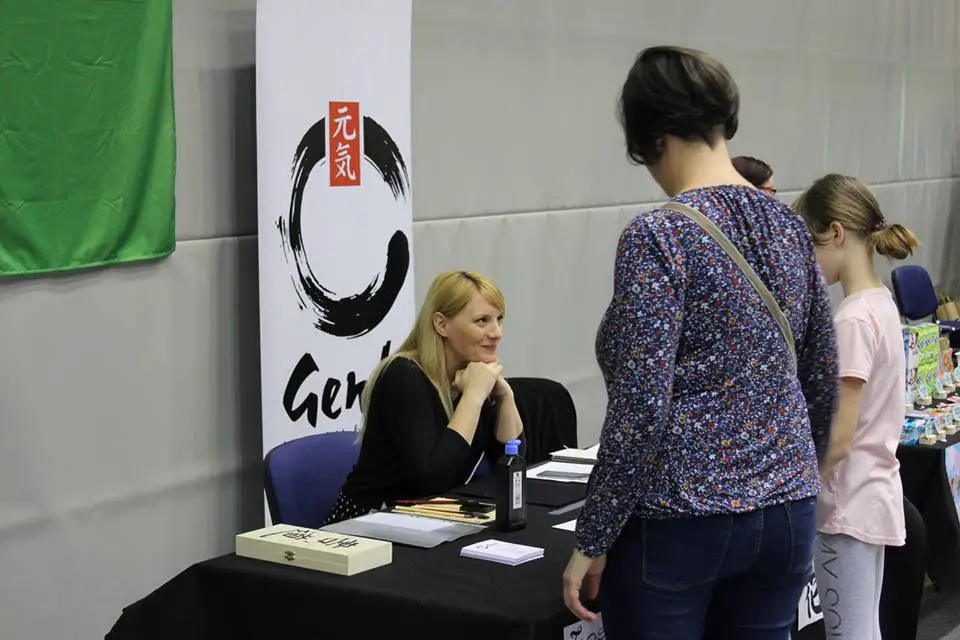
What's your association with Japan?
I am a Japanologist and a sociologist of culture, graduate of the Faculty of Arts in Ljubljana and also studied at Joshi daigaku in Tokyo, Japan. I am a founder and a CEO of Genki Center, and also a president for the organisation behind the Day of Japan event. As a professional in the fields of Japanese culture and language, and a passionate learner of the culture and its language, I carry with me strong passion to promote Japanese culture to Slovenian people. Since it’s very rich in its history, folklore and heritage, many new areas of interest can be found in this island nation.
What is Genki Center?
It’s the first private Japanese educational and cultural centre in Slovenia. We specialize in this area and provide Slovenian people with different kinds of support regarding this culture and language. Our primary activity is teaching Japanese, we have a team of Japanologists and also a native speaker who is a professor of Japanese. We strive for a modern techniques of teaching and provide a very high quality way of learning the language and culture. Together with our clients we create a strong community of people who have the same interests. That is why we are not a language school, but a community of people, organizations and interest groups brought and kept together with the same aim of exploring different aspects of Japanese culture and language.
As part of this work we provide support for companies, advising them on business ethics and language norms, as well as Japanese business relations. We also offer various events, workshops and lectures to teach Slovenian people about Japanese culture, with some children. For example, we have been organizing Japanese summer camps and different Japanese themed events.
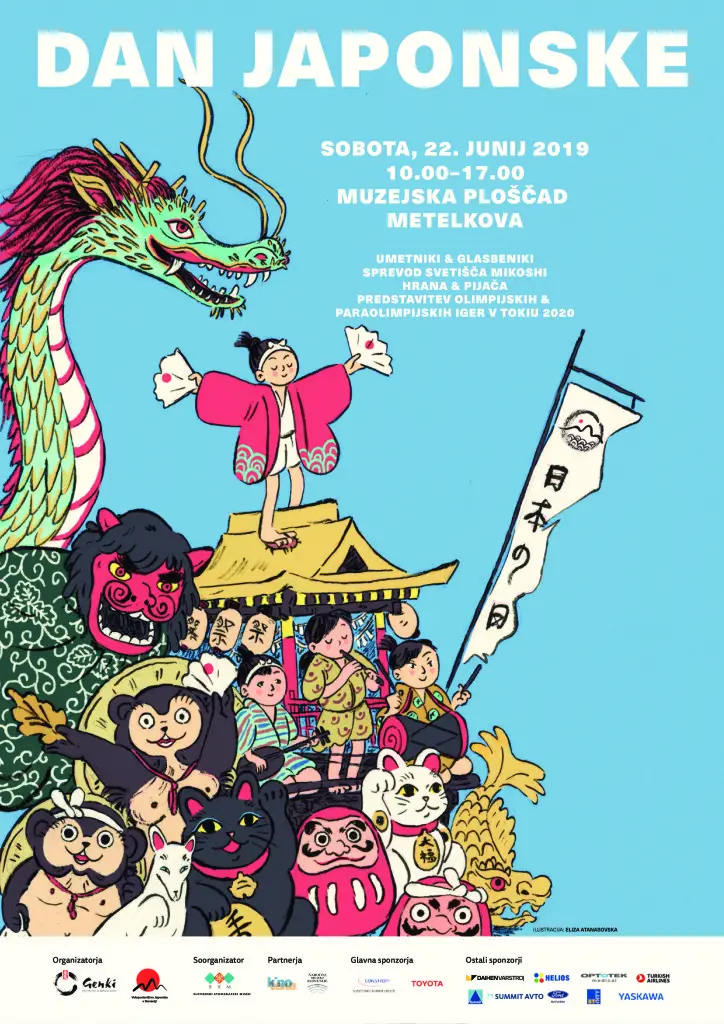
This Saturday, June 22 (2019) is the Day of Japan. How did that start?
This year will be the 8th Day of Japan festival, which has two organizers. The first is Genki Center as initial idea provider and organizer, and the second is the Embassy of Japan in Slovenia, which has co-organized the event for the last seven years.
The idea for the event came after my first small event in Kranj, with the opening of Kranj's new library in 2011. After the success of the “Japanese Evening” my college and I planned to organize our first event at lake Zbilje with the help of local tourist organization. That was in 2012, with the 20th anniversary of diplomatic relations between Japan and Slovenia were taking place, and so we invited the staff at the Embassy of Japan in Slovenia, and a sakura tree as planted to mark the event. After that the Embassy invited me to continue organizing the event with them, and we have been working together successfully ever since.
It may only be one day, but it’s a lot of work. The organization takes about half a year to plan, and every year with the help of volunteers we build an event site from scratch and also tear it down once it is finished.
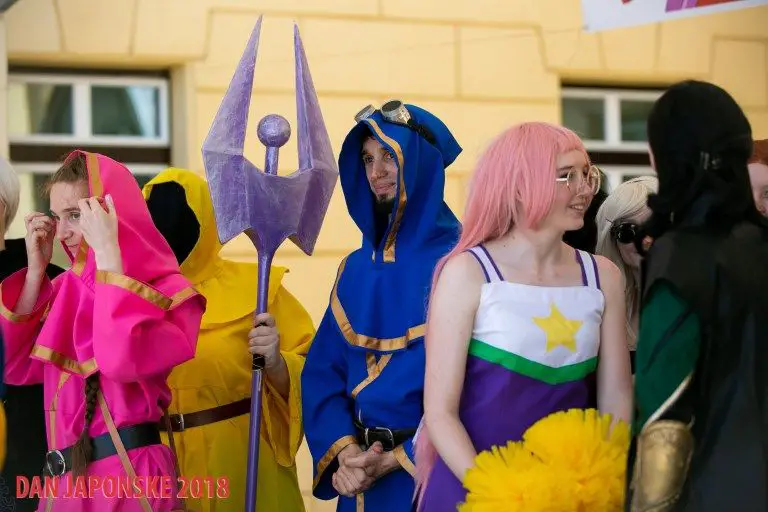
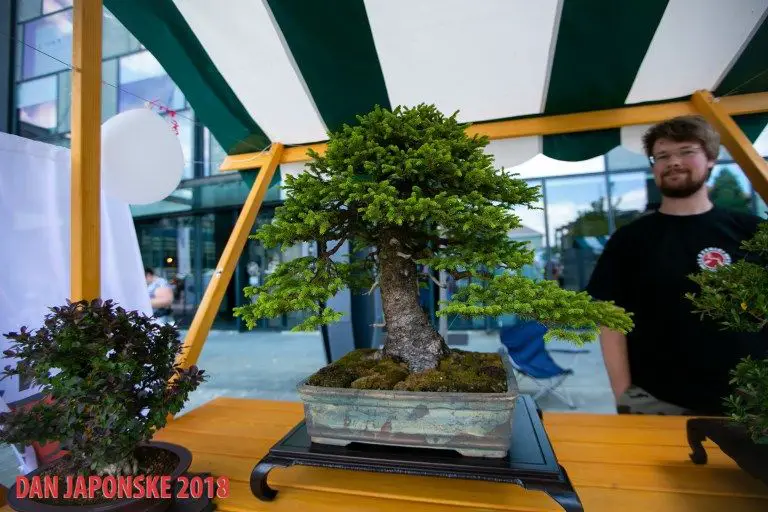
The idea is to bring together the many people in Slovenia who are somehow connected with Japanese culture in a daily life, and also companies and individuals. And it’s not just about showing Japan to Slovenians, but also a way for Japanese people living in Slovenia to feel a part of the community and share their culture with others.
The Day of Japan is a single day event where we strive to bring together as many different aspects of Japanese culture in the same place, at the same time, and a way for people to basically visit the country without leaving Ljubljana. In a single location [the Metelkova museum quarter] we have more than 80 activities, 50 stands, two stages and one lecture hall where we cover many different cultural aspects of Japan – the language, arts, sports, food, crafts and stores. We want to offer as many quality services, products and activities as we can find in Slovenia that are related to Japanese culture. We’ve also invited some guests from Japan, who are willing to enrich the event. This year there are more than 250 participants who are making it all possible, along with more than 30 volunteers.
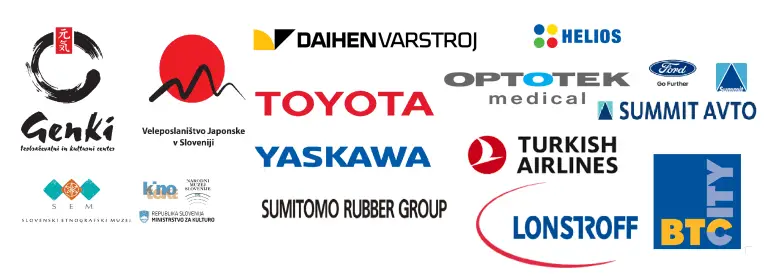
As well as the Embassy of Japan, the event gets a lot of support from companies, and this year there’ll be something from Toyota, Sony, Turkish Airlines (who will be giving away two plane tickets to Japan), BTC City will be there its Society 5.0 project, along with people from the Olympic Games committee and the Paralympic Games committee, who will have a special Olympics corner.
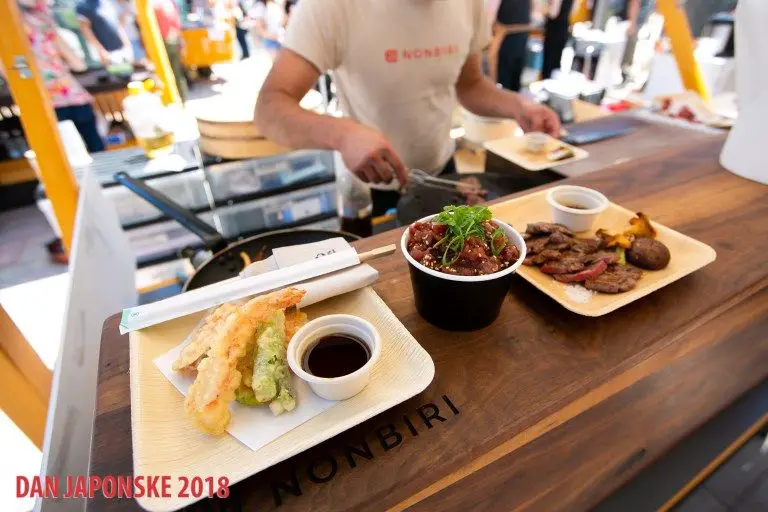
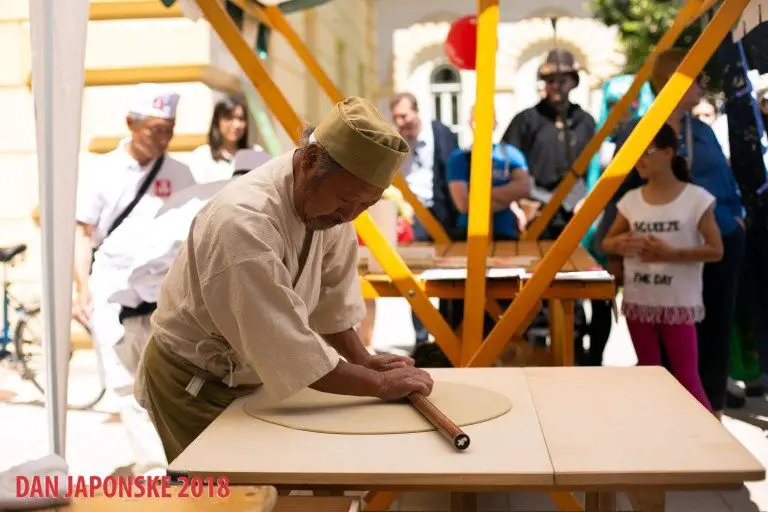
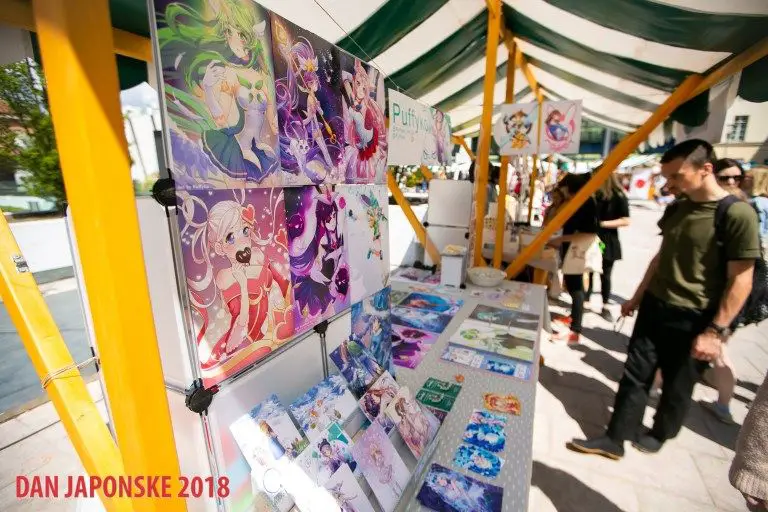
What can people expect to find there?
Among activities we are offering are many martial arts, such as karate, aikido, kyudo, ninjutsu, iaido and kendo, and judo. We also have many artists, young ones who are specializing in Japanese anime and manga, and they will provide us with unique artwork. There will be traditional crafts, too, like ceramics, wooden lacquer, kanzashi and tamari balls. Also in the spiritual area we have zen gong meditation, reiki, and we used to have shiatsu. There will be bonsai, ikebana and Japanese calligraphy, and for younger people there’s a manga corner and cosplay.
For food, we have a sweets corner and food corner, with quite nice variety of Japanese different dishes. The people preparing the Japanese food are trying to stick to the original taste, which is quite difficult to do in Slovenia with regard to finding high quality ingredients. We’ll have a school for Japanese language, Japanese literature, books and travelling to Japan. Every year we also have a children’s corner with many Japanese arts to them to enjoy.
Beyond that, in the lecture room of the Ethnographical Museum of Slovenia we have a photo exhibition, a lecture on traveling to Japan, and workshops for ikebana and calligraphy. On the main stage we have a concert of Trio Tenorjev [Three Tenors], traditional buyo dance, and Japanese pop songs, as well as much using a koto, a traditional instrument.
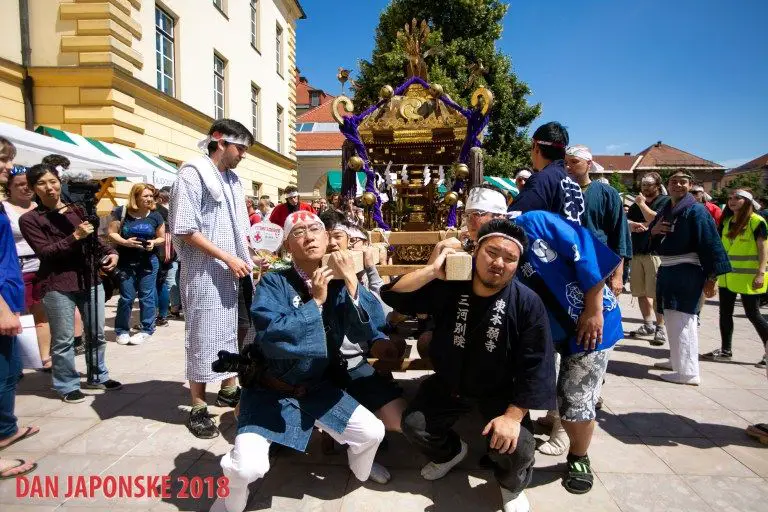
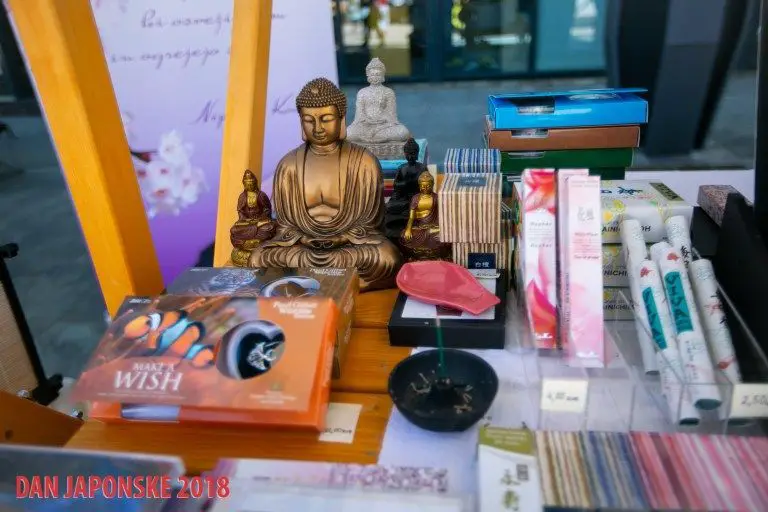
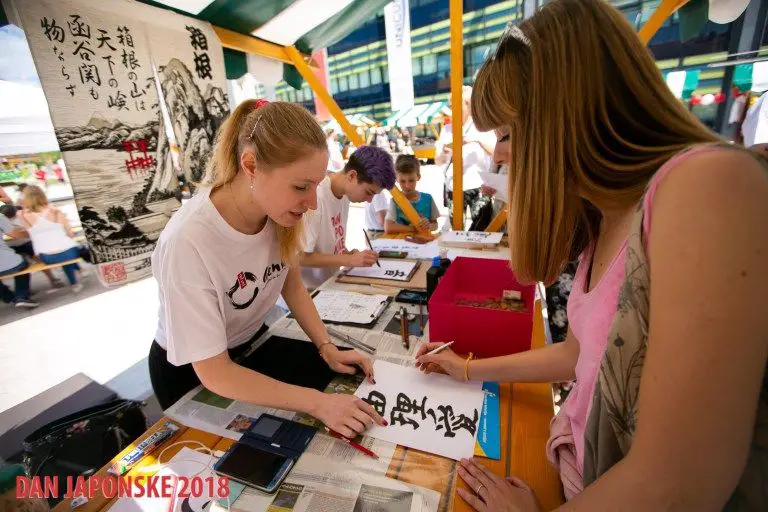
One very special thing will be a portable shrine brought from Kasuga jinja, close to Yokohama, carrying many Japanese deities in order to bless the area with good fortune and luck. It should be a great event. Last year we had more than 3,500 visitors, and hopefully this year the number will be even greater.
You can find the schedule for the Day of Japan (Dan Japonske) here, and follow Genki Center at its website or on Facebook. The event takes place in the museuem quarter of Metelkova, shown on the map below.
STA, 10 June 2019 - Ways of encouraging economic cooperation, especially trade and investment, were in the focus of Monday's meeting in Ljubljana between Japan's State Minister of the Economy, Trade and Industry Yoshihiro Seki and Slovenia's State Secretary Aleš Cantarutti.
Bilateral trade reached EUR 196.3 million in 2018, which makes Japan Slovenia's 32nd largest trade partner, the Ministry of Economic Relations and Technology said in a release, noting "Japan's investments contributed to Slovenia's excellent economic performance in 2018".
Cantarutti and Saki also discussed NEDO, a three-year Japanese-Slovenian project developing smart networks, and Society 5.0, a Japanese initiative focusing on the question of how to utilise modern scientific and technological breakthroughs for the benefit of all segments of society.
The ministry said Society 5.0 was an area in which Slovenia and Japan should continue cooperation, as this would be one of the priorities during Slovenia's EU presidency in 2021.
Signing a bilateral agreement on regular air traffic and a deal on flights between air carriers Adria Airways and ANA would be according to the ministry very important for Slovenia, as an increasing number of Japanese tourists visits Slovenia.
Seki, on the other hand, pointed to the Slovenian law on foreigners, which he said made it very hard to obtain all the necessary work permits.
Cantarutti welcomed the idea for Slovenia to take part in the EXPO 2025 in Osaka, and the Olympics Tokyo will host in 2020 were highlighted as another area with a great potential for bilateral cooperation.
STA, 8 April 2019 - The Japanese robot manufacturer Yaskawa, the world's leading manufacturer of industrial robots, inaugurated a new robot factory and a European robotics R&D centre in the town of Kočevje (SE) on Monday, two years after construction was launched. The facilities are to employ some 200 people.
The EUR 25m investment has been co-funded by the state, which chipped in EUR 5.6m.
The director of the recently founded Kočevje-based company Yaskawa Europe Robotics, Hubert Kosler, told the press after the opening that the new factory would complement the production capacities in Japan and China, satisfying some 80% of the European market's demand for Motoman robots.
The new factory in Kočevje is expected to produce up to 10,000 industrial robots per year, manufacturing seven types of them. At the moment it employs 50 people and aims to double the number by next year. By 2023, it should employ some 200 people.
The president and executive director of Yaskawa Europe, Bruno Schnekenburger, said that the new facility was Yaskawa's response to the growing demand for industrial robots in Europe, Middle East, Africa, and Russia. The company is thus striving to localise its supply chains and reduce delivery periods.
Yaskawa also believes that the reconstructed railway line between Kočevje and Ljubljana will enable a quicker connection with the Port of Koper. Freight trains should start running on the railway in the coming days, according to the STA's unofficial information.
Addressing the opening, Prime Minister Marjan Šarec expressed satisfaction that the factory is located in an area that was often labelled as undeveloped and neglected part of the country. This sentiment was also echoed by Economic Development and Technology Minister Zdravko Počivalšek.
Šarec prised Kočevje Mayor Vladimir Prebilič as well as the previous government, for seeing the project through. He said that Slovenia had good relations with Japan and that these would only improve. "The best ideas are born in cooperation."
Yaskawa Europe regional director Manfred Stern pointed out today that the company's investments in Slovenia as well as recent investments Germany, France, and Sweden were the strategic part of Yaskawa's European initiatives set out in its global corporate goals.
Yaskawa had picked Kočevje as the location of its first facility for industrial robots not only in Europe but also outside Asia. Slovenia will also serve as the distribution nexus point for the robots manufactured in Japan.
The robotics R&D centre will improve the company's cooperation with local faculties and institutes. Yaskawa already cooperates with the Faculty of Mechanical Engineering and Faculty of Electrical Engineering as well as the Jožef Stefan Institute.
The company first entered Slovenia in 1994 when Yaskawa Electric took over the Germany-based Slovenian company Motoman Robotec. Two years later, it founded a company for robotic cells production Yaskawa Ristro in the town of Ribnica near Kočevje. Yaskawa Slovenija is also situated in Ribnica and manages the company's sales in Slovenia and other markets of the former Yugoslavia.
Stern signed a letter of intent with the Economy Ministry and the Kočevje municipality in May 2018, aiming to launch facilities for the production of electric motors and electronic components, which would create up to 250 jobs.
The investment is estimated to be worth EUR 20-30m, with the production being scheduled to start within two years.
STA, 8 May 2018 - NEDO, a three-year smart technology project bringing together since November 2016 Slovenian grid operator ELES and NEDO, Japan's new energy and industrial technology development organisation, has entered a second phase in which the focus will be on smart communities.
The move is part of a plan to boost underdeveloped areas.
Slovenia builds more connections with Asia.




